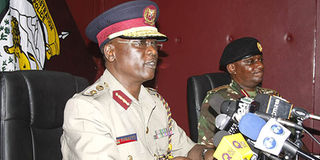State officers on spotlight over links with Al-Shabab

Inspector General of Police David Kimaiyo addresses a press conference in Nairobi on March 29, 2013. Inspector General of Police David Kimaiyo said all officers ,involved would be dismissed once investigations are completed.
What you need to know:
- So far the head of criminal investigations in Garissa has been sent home and faces charges in court once investigations have been completed.
- A senior security official who spoke to the Nation on condition of anonymity revealed that the operations ran so deep such that almost the entire government machinery in the area was affected.
Government officials are on the spotlight over links with terrorist group Al-shabaab and trade of contraband on the Kenya-Somalia border.
Investigations are underway and it has emerged that the illegal trade was being used to fuel deadly attacks in Garissa town, where most of attacks blamed on Al-shabaab have occurred.
The network is controlled by powerful businessmen in Kenya and Somalia and government officials including the police, chiefs, immigration and custom officers ensure that its not interrupted.
The big bulk of commodities smuggled into Kenya include sugar, powder milk and rice as well as electronic goods. A senior security official who spoke to the Nation on condition of anonymity revealed that the operations ran so deep such that almost the entire government machinery in the area was affected.
“The officials have been doing this for a long time and its no wonder the previous interventions to stop the attacks were not successful,” said internal security permanent secretary Mutea Iringo. r Mr Kimaiyo said all officers ,involved would be dismissed once investigations are completed.
“I’ve sent senior investigators and they are already in Garissa. Once they are through they will provide a list and make recommendations on who should go home but of course with evidence,” said Mr Kimaiyo.
While the traders are involved in the actual business of smuggling, the government officials receive bribes and thus turn a blind eye on the operations, ensuring the criminals are not brought to book.
In corrupting custom officials, goods brought in to Kenya from Somalia are never inspected and no duty is paid for them.
On their part, police and chiefs, who form an integral part of the security and intelligence machinery on the ground, ensure the information on the illegal trade is never acted upon and so the criminals continue to operate with impunity.
With some parts of Somalia still under Al-shabaab control, the militants are well involved in transporting the contraband and levy charges, then use the money to sustain their fighters as well as purchase arms and explosives, some of which are used in attacks in Kenya.
So far the head of criminal investigations in Garissa has been sent home and faces charges in court once investigations have been completed.
Also dismissed from service were the chiefs in charge of Liboi, Dertu and Kulan locations.
Assistant chiefs in Liboi and Dertu were also forced out of office.
According to the official, Garissa area would be left without an administration in place if radical action was to be taken at a go.
“Almost the entire government team is rotten but it would not be wise to dismiss all of them at the same time because it would leave a void in the area. It was agreed that the action be stretched over a period of time keeping in mind that all those involved must be held accountable,” according to the official.
The rot was unearthed by a high level fact finding mission in Garissa following at attack at Kwa Chege food parlour in which 10 patrons were shot dead on April 18.
The mission was led by Internal Security permanent secretary Mutea Iringo.
In a signed statement, he gave an 11-point action plan directed at the police chiefs in the area which included carrying out a massive security operation.
The Nation visited the area in the course of the operation and found out that the frequent attacks had taken different facets since they started in late 2011.
Initially, the attacks were terrorism-related in reaction to Kenya Defence Forces war in Somalia against the Al-shabaab.
However, most recent attacks, including the one at Kwa Chege food parlour were masterminded by local businessmen with the aim of pushing out their competitors out of business.
The business rivalry pits businessmen from local communities that live in North Eastern against those from other parts of Kenya.
The smuggling cartels thrive because their commodities are affordable to consumers because they are sold at a relatively low price.
The commodities are usually sourced from Somalia port of Kismayu that until last year was under the Al-shabaab militia before being ousted by the KDF.
Without a stable administration in Somalia, the bulk of the imports from the Middle East is never taxed. They are transported in lorries into Kenya where the cartels are ready to pay hefty bribes to avoid taxation.
Of the many attacks that are under police investigation include the killing of two Kenya Revenue Authority custom official who were shot dead in broad daylight a few weeks ago.
A trader in Garissa town who knew the two officials told the Nation that prior to the killing, they had been threatened by one of the influential businessmen involved in the illegal cross border trade.




